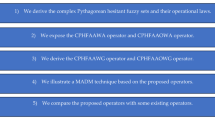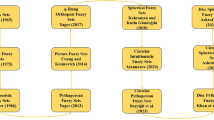Abstract
We develop in this paper a novel entropy-independent knowledge measure (KM), with which to reveal some significant aspects of psychological cognition hidden in the handling of intuitionistic fuzzy sets (IFSs). We briefly discuss the two facets of knowledge associated with an IFS, i.e., the information content and the information clarity. We then establish, based on the latest axiomatic definition of KM in the context of IFSs, a novel parameterized KM in which two significant aspects of psychological cognition are considered, personal attitude and preference to be exact. We believe that the KM provided in this manner could truly capture the unique features of an IFS, including the potential knowledge related to the specificity and non-specificity of an IFS, the amount of which depends actually on users’ character traits. The developed KM is equipped with two parameters, one of which expresses the type of attitude towards the non-specificity of an IFS while the other indicates the degree of personal preference between those two facets of knowledge. We also show that some existing measures can be obtained as particular cases of this general model. Finally, we illustrate the application of this measure in decision making under uncertainty.
Similar content being viewed by others
References
Atanassov K (1986) Intuitionistic fuzzy sets. Fuzzy Sets Syst 20:87–96
Zadeh LA (1965) Fuzzy sets. Inf Control 8:338–353
Atanassov K, Gargov G (1989) Interval-valued intuitionistic fuzzy sets. Fuzzy Sets Syst 31:343–349
Bustince H, Burillo P (1996) Entropy on intuitionistic fuzzy sets and on interval-valued fuzzy sets. Fuzzy Sets Syst 19:305–315
Hung WL, Yang MS (2006) Fuzzy entropy on intuitionistic fuzzy sets. Int J Intell Syst 21:443–451
Szmidt E, Kacprzyk J (2001) Entropy for intuitionistic fuzzy sets. Fuzzy Sets Syst 118:467–477
Das S, Dutta B, Guha D (2016) Weight computation of criteria in a decision-making problem by knowledge measure with intuitionistic fuzzy set and interval-valued intuitionistic fuzzy set. Soft Comput 20:3421–3442
Nguyen N (2016) A new interval-valued knowledge measure for interval-valued intuitionistic fuzzy sets and application in decision making. Expert Syst Appl 56:143–155
Montes I, Pal NR, Montes S (2018) Entropy measures for Atanassov intuitionistic fuzzy sets based on divergence. Soft Comput 22:5051–5071
Guo K (2016) Knowledge measure for Atanassov’s intuitionistic fuzzy sets. IEEE Trans Fuzzy Syst 24:1072–1078
Szmidt E, Kacprzyk J, Bujnowski P (2014) How to measure the amount of knowledge conveyed by Atanassov’s intuitionistic fuzzy sets. Inf Sci 257:276–285
Nguyen N (2015) A new knowledge-based measure for intuitionistic fuzzy sets and its application in multiple attribute group decision making. Expert Syst Appl 42:8766–8774
Guo K, Zang J (2019) Knowledge measure for interval-valued intuitionistic fuzzy sets and its application to decision making under uncertainty. Soft Comput 23:6967–6978
Guo K, Xu H (2019) Knowledge measure for intuitionistic fuzzy sets with attitude towards non-specificity. Int J Mach Learn Cybern 10:1657–1669
Herrera-Viedma E, Chiclana F, Dong Y, Loia V, Fujita H, Kou G (2018) Special issue on intelligent decision-making and consensus under uncertainty in inconsistent and dynamic environments. Knowledge- Based Systems 162:1–264
Guo K (2014) Amount of information and attitudinal based method for ranking Atanassov’s intuitionistic fuzzy values. IEEE Trans Fuzzy Syst 22:177–188
Xu Z (2007) Intuitionistic fuzzy aggregation operators. IEEE Trans Fuzzy Syst 15:1179–1187
Yager R.R. (2004) OWA aggregation over a continuous interval argument with applications to decision making. IEEE transactions on systems, man, and cybernetics (part B: cybernetics) 34: 1952–1963
Guo K, Xu H (2018) Personalized quantifier by Bernstein polynomials combined with interpolation spline. Int J Intell Syst 33:1507–1533
Guo K (2019) Expected value from a ranking of alternatives for personalized quantifier. IEEE Intell Syst 34:24–33
Wu J, Sun Q, Fujita H, Chiclana F (2019) An attitudinal consensus degree to control feedback mechanism in group decision making with different adjustment cost. Knowl-Based Syst 164:265–273
Wu J, Zhao Z, Sun Q, Fujita H (2021) A maximum self-esteem degree based feedback mechanism for group consensus reaching with the distributed linguistic trust propagation in social network. Information Fusion 67:80–93
Guo K, Li W (2012) An attitudinal-based method for constructing intuitionistic fuzzy information in hybrid MADM under uncertainty. Inf Sci 208:28–38
Feng F, Fujita H, Ali M, Yager RR, Liu X (2019) Another view on generalized intuitionistic fuzzy soft sets and related multiattribute decision making methods. IEEE Trans Fuzzy Syst 27:474–488
Garg H, Rani D (2019) A robust correlation coefficient measure of complex intuitionistic fuzzy sets and their applications in decision-making. Appl Intell 49:496–512
Feng F, Liang M, Fujita H, Yager RR, Liu X (2019) Lexicographic orders of intuitionistic fuzzy values and their relationships. Mathematics 7(2):166, 1–26. https://doi.org/10.3390/math7020166
Feng F, Xu Z, Fujita H, Liang M (2020) Enhancing PROMETHEE method with intuitionistic fuzzy soft sets. Int J Intell Syst 35:1071–1104
Acknowledgements
This work is supported in part by the National Natural Science Foundation of China under Grant No. 71771110, and in part by the Planning Research Foundation of Social Science of the Ministry of Education of China under Grant No. 16YJA630014. The authors would like to thank the Editors-in-Chief, Professor Hamido Fujita and Professor Moonis Ali, the Editors, and the anonymous reviewers for their constructive comments and suggestions, which have greatly improved the presentation of this research. The authors are also grateful for the help and encouragement given by Professor Lihua Wei.
Author information
Authors and Affiliations
Corresponding author
Additional information
Publisher’s note
Springer Nature remains neutral with regard to jurisdictional claims in published maps and institutional affiliations.
Rights and permissions
About this article
Cite this article
Guo, K., Xu, H. Preference and attitude in parameterized knowledge measure for decision making under uncertainty. Appl Intell 51, 7484–7493 (2021). https://doi.org/10.1007/s10489-021-02317-2
Accepted:
Published:
Issue Date:
DOI: https://doi.org/10.1007/s10489-021-02317-2




